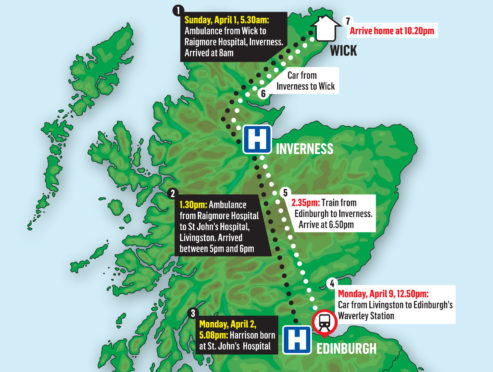A Caithness woman was forced to make an eight-hour journey to give birth 260 miles from home because there was no specialist cot available at Raigmore.
Emma Moffat, 28, who has type one diabetes, always knew she would have to travel to Inverness for the birth.
But she did not anticipate another 160 miles being added to the journey when baby Harrison decided to come into the world five weeks early. There were no cots available in Raigmore Hospital, so she was sent all the way to Livingston, near Edinburgh, for a caesarean section.
MP for Caithness Jamie Stone has called on NHS Highland and the Scottish Government to do something about the lack of capacity in the maternity unit at Raigmore. Most Caithness mums are now sent to Inverness to give birth.
Mr Stone said: “I have seen with my own eyes just how hard pressed Raigmore’s maternity unit is. The staff there face incredible pressures owing to the lack of capacity.
“This latest revelation is deeply worrying. Quite apart from all the stress for the family, it is a stark pointer to the fact that the system is far too stretched and that NHS Highland and the Scottish Government must face up to this and act.
“I have a debate in my name in the Commons next week about patient transport and I shall make mention of this case.”
Ron Gunn, vice chairman of Caithness Health Action Group (Chat), said: “This is another case of a poor mother having to travel to Inverness, then being told there are no facilities for them. We are aware of women that have gone to Aberdeen, Edinburgh and now this one.
“If the intention is to take most mothers to Inverness, then they really have to have facilities to deal with that.”
When asked why a helicopter was not used for the journey, an ambulance service spokeswoman said: “Each case is reviewed on an individual basis and a full clinical assessment was undertaken where it was deemed by clinicians that the patient could be safely transferred by road.”
Miss Moffat attended at Caithness General Hospital in premature labour before being taken by ambulance to Inverness. She said: “In Inverness I was told I had to go to Stirling as Raigmore had no cots, then the consultant came back and said Livingston.”
Her partner, Jamie Sutherland, 24, wasn’t allowed in the ambulance and had to arrange for a family member to drive him to Livingston.
Miss Moffat said: “It wasn’t the comfiest of journeys.
“Inverness would have been easier for us because we are closer to home. Luckily I have got family in Edinburgh or we would have been on our own.”
Baby Harrison was born on April 2 at St John’s Hospital in Livingston weighing 5lb 13 ozs.
The couple brought the baby home by train from Edinburgh to Inverness. Miss Moffat said: “The train was not really suitable for a new baby. I wasn’t happy with it.”
A spokeswoman for NHS Highland said: “As with any service there is a limit to capacity. On rare occasions the Special Care Baby Unit (SCBU) in Raigmore Hospital can be at capacity which can result in mums to be, or mums and babies being transferred out with Highland.
“Whilst SCBU has the facility to stabilise emergencies even when busy there is then a clear pathway and criteria in place in terms transferring patients using the national retrieval team to the closest available unit. This ensures that mums and babies are taken to a place where they are getting the most appropriate care.
“The reason for this type of transfer is the unpredictable and variable demand on special care baby cots, and while undesirable this remains an inevitable component of providing safe care in a networked way across Scotland.”
A Scottish Government spokeswoman said: “It is vital that all pregnant women – including those in remote and rural locations – receive safe, high quality service.
“There may be times in all areas of Scotland when, due to medical complications or peaks in demand, women and babies are required to travel to ensure the best possible care. Our Scotland-wide network of special care baby units ensures both mothers and babies requiring additional care receive it in high quality units most suitable for their needs, from our most experienced staff.”
Comment, Page xx
